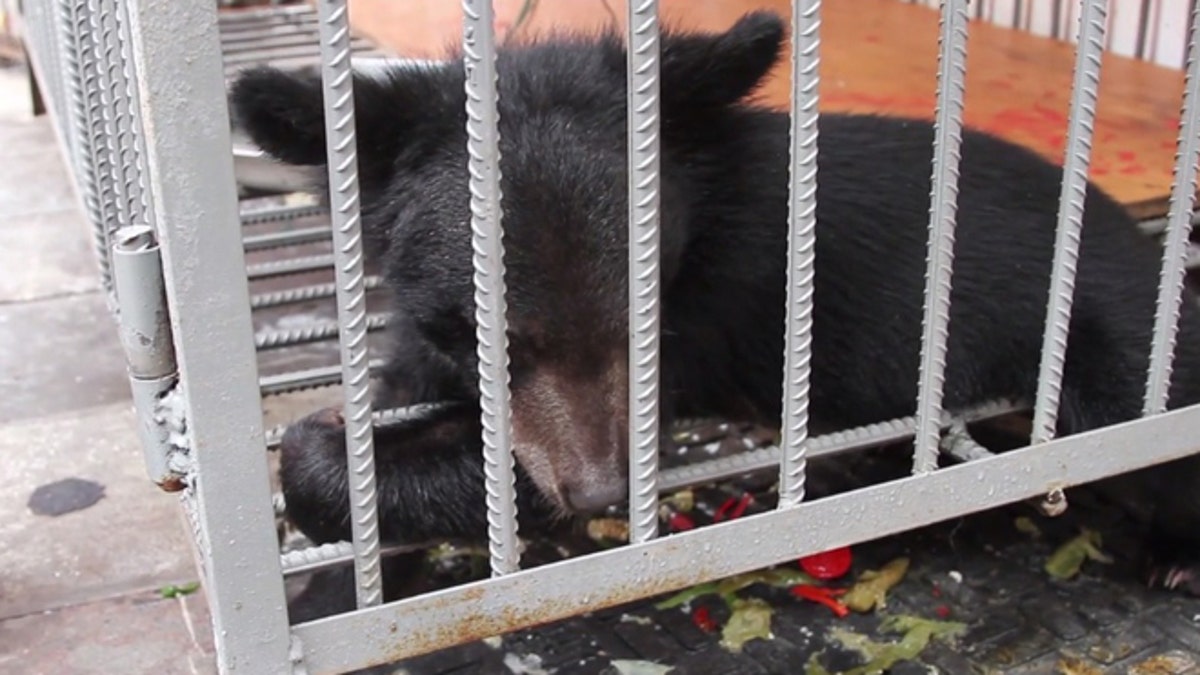
Bear cubs are often kept in cages outside restaurants where diners can order up "delicacies" like bear paw soup. (Vimeo/EIA)
Bears cubs and tiger bone wine are reportedly on the menu at an Asian luxury resort that caters to China's nouveau riche.
An investigation conducted by the London-based Environmental Investigation Agency (EIA) has uncovered a rampant illicit animal trade in the Golden Triangle Special Economic Zone—a tax-free region in Southeast Asia controlled by Hong Kong-based Kings Romans Group. The Golden Triangle encompasses three Southeast Asian countries-- Laos, Burma, and Thailand.
Visitors can dine on expensive “delicacies” like bear paw, monitor lizards, pangolins—an endangered mammal resembling a small, shell-less armadillo— snakes, turtles and wash it down while they sip tiger bone wine, says the environmental protection group.
In addition to restaurants offering illegal exotic fare, local markets openly sell elephant ivory crafts and tiger skin rugs.
In the report “Sin City,” the EIA calls the zone a “lawless playground” where newly wealthy Chinese can shop for “luxury goods” that have become a new status symbol in a culture of conspicuous consumption. Sniffing rhino horn dust and drinking animal infused wine have become symbols of "power and wealth."
“Stuffed tigers, tiger skins, carved ivory and helmeted hornbill casks are luxury products, purchased for vanity and increasingly as assets, just like gold or jade. The tiger bone wine that is openly for sale is marketed to men as a ‘strengthening tonic,’” Debbie Banks, Head of the EIA’s Tiger Campaign told the Guardian. She said that “the open trade makes it feel like an illegal wildlife supermarket, where you can just browse, pick and choose without any fear of enforcement.”
The report gives disturbing insight about the exotic animal trade in the Golden Triangle. Undercover agents visited an animal farm that housed 38 Asiatic bears and 25 tigers—all destined to be skinned, butchered and sold for skins, meat and bones.
“The keeper told investigators the plan is to acquire a total of 50 [female tigers] for breeding, with the aim of producing 500 tigers within three years and up to 1,000 tigers in the long term,” details the report.
Laos is estimated to have just 20 wild tigers roaming the country, meaning that the number that those living in captivity outnumber those in the wild.
“The Chinese businesses and consumers are exploiting weak enforcement in Laos, but the Laos government can’t pretend they are ignorant of what is going on,” Banks told the Guardian. But that doesn’t mean China should be off the hook.
She continued “There needs to be greater investment [by China] in intelligence-led enforcement to pursue the Chinese businesses and individuals who are running operations at the [Golden Triangle Special Economic Zone]... These shouldn’t be periodic operations that are co-ordinated once a year, but full-time, multi-agency operations.”
The EIA says that even though the international illegal animal trade has received more high profile attention in recent years, demand for unusual goods among China’s new elite continues to fuel the illicit system.
In addition to changing laws regarding captive animal breeding, the EIA recommends the government of Laos to establish a special task force of investigator and prosecutors dedicated solely to wildlife crime. China should crack down on border policing of illicitly traded animal foods.
Sin City: Illegal wildlife trade in Laos’ Special Economic Zone from EIA on Vimeo.
